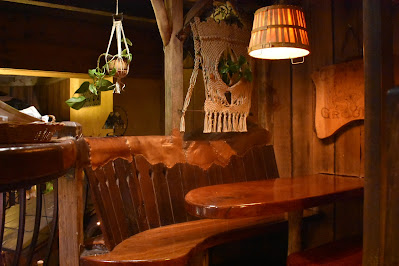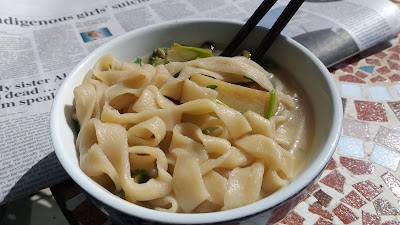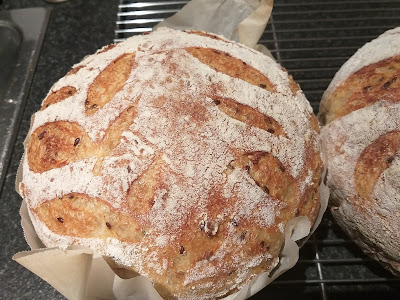Last week, my friend J and I went up to the Blue Mountains for a midweek getaway. We met in February 2001 on our first day at medical school. We were taking the same 891 bus to UNSW - she sat down opposite me, we started chatting and as they say, the rest is history. We have lived through so much together in the last two decades, finishing medical school, specialty training, overseas fellowships, relationships and heartaches..
These days we both have busy lives as specialists, and plan our holidays around international trips. J usually travels around neurology conferences, while I usually meet up with friends for music. 2020 has chucked a spanner in the works with Covid and all our international trips have been cancelled. Australia has been running an ad promotion "This year, Holiday here." and it seeped into my consciousness. This trip to the mountains was inspired by an article I read on the bore baths at Lightning Ridge. But Lightning Ridge is so far away, so we thought of going to the Japanese baths in the Blue Mountains instead.
We found a nice Airbnb in Leura and the hosts generously offered us an extra night when they heard that we were stressed out doctors. On the way out of Sydney, we discussed our plans to do a digital detox. We are both heavily reliant on our phones for work as well as keeping in touch with family and friends. But we know all about the deleterious effects of our phones - the conscious and unconscious distractions, the unaware passage of time, the ups and downs of dopamine. Every time we hear the "ding", our primitive brains start thinking Someone loves me! Who is it? What are they saying? It is extremely difficult to break out of this dopamine cycle, and I am not any different to the average person. Even though I don't have Facebook or Twitter, I still use Whatsapp constantly to talk to my friends, particularly those overseas who I cannot see in person. In the end, we agreed to try a digital detox and get away from emails and social media. What a blissful time it was!
I packed a "Fun Bag" which reminded me of road trip holidays from pre smart phone days. It had a jigsaw, scrabble, magazines and books, sketching materials, my journal, an old school camera, and knitting. I think all these things bring a stronger tendency for me to actually focus on the moment, rather than being distracted and in three different places at once.
After a long sleep in, we explored the gardens at the Airbnb full of beautiful flowers, a truly stunning garden.
Later we went to Sublime Point and were blown away by the majestic view.
While there, we got talking to some other visitors. Initially I thought they were a couple, but as they talked I realised that they were actually mother & son. How nice it is that a grown up 25 year old man still wants to go on a mid week holiday with his mother! We talked about our digital detox and they were amazed we were driving around the mountains with no navigation. The son was a newly graduated nurse at a major hospital where J had worked, a strange random connection. He told us stories about how his transition to nursing practice has opened his eyes to how life really works. One story was really quite striking. Being of Italian background, he had connected with an older Italian gentleman who he viewed as his "Nonno". One night, the patient died unexpectedly and he was utterly shocked to find this out when he arrived at work. One of the senior nurses took him aside and told him that they would look after the patient, that he should take a break from being responsible for taking care of the body. In retrospect he realised that the senior nurse had recognised the impact this would have on him and was trying to shield him from that sadness. It was an apt reminder that got me thinking back to my own junior years.
Then we went out to Wentworth Falls for a short walk. The effects of the bushfire season over 2019-2020 summer are still quite evident.
Everywhere we turned, the blackened trees still gave off the faint scent of smoke. Lots of green had emerged in the bush, leaves growing from crevices of burnt stumps. The fires must have been so devastating that much of the track was destroyed, and the main walk in the area (National Pass) is still partially closed.
We had dinner at the Yellow Deli cafe, run by a cult with a farm in the local area. I often drop by when I am in Katoomba because it is such a quaint place with beautiful furniture.
I had a warming bowl of chili and a mug of mate latte to complete the hipsteriffic dinner. It was pretty cold and misty in the mountains.
The next day we drove up to Medlow Bath for afternoon tea at the Hydro Majestic. This is an old hotel from the 19th century that has been recently refurbished.
The views from the hotel are unparalleled, overlooking the expansive valley.
We had a traditional afternoon tea - fluffy warm scones, traditional savoury sandwiches and dainty little sweets. I don't know of any better place for a high tea!
We went a little further up the mountain to Blackheath, where it was a beautiful clear day at Govett's Leap lookout. Here also, the bushfires had been quite bad last summer. Parts of the track were closed but we could descend to the first lookout over Bridal Veil falls.
There was hardly any water in the falls, but the view over the valley was gorgeous and we soaked up a bit of sunshine.
On the way back we gave a ride to a woman in her late 30s who we had met briefly at the lookout. She had screamed I'm free! some time after we had left the lookout, her voice echoing across the valley. It must have felt amazing to scream! We were still contemplating the view at the lookout when she approached us and asked if we could give her a ride. She explained that she had walked the 4km or so from the train station but a strange man had followed her along the way. He kept pestering her and asking where she was staying, and she was terrified. Being slightly out of town, she couldn't find an Uber to get back to the station. It was sobering to remember how vulnerable we can be as solo female travellers, and we were glad to be of some help to her.
On our last day in the mountains we said goodbye to our lovely airbnb hosts and went up to Katoomba to visit the Lost Bear Gallery. I loved the collection here - an eclectic mix of Australian landscapes, photography, sculpture, blown glass and some modern art. We got talking to the gallery owner Geoff who shares the space with his gorgeous 11 year old dog Nugget.
There was a beautiful old German grand piano there that had been restored, and the art gallery setting for this kind of piano was just perfect.
Our final stop on the holiday was at the Japanese bath house in the upper mountains.
Just short of Lithgow, the bath house is in a stunning location overlooking Lake Lyell. Unlike the original onsens, we were required to wear bathing suits and it was not gender segregated. Most of the baths were the same temp of 38 degrees, with one extra hot pool, a herbal steam room and associated cold pool. Some of the baths were set up in spectacular locations with panoramic lake views. What is it about water that is so calming? And of warm water in bath form, it must remind us of the amniotic fluid of the womb...
After the bath we made a quick stop in Katoomba for dinner at the trendy 8Things, a hipster street food joint with 8 dishes inspired from different countries around the world. The descent from the mountains was extremely foggy with visibility of less than one car at places. Nevertheless, we arrived home feeling relaxed.
It was amazing to get away from our devices even just for 3 days. I experienced a kind of mental reset and an awareness of presence. It's been a long time since I had this time to just be with my friend, and not try to do a billion things at once. It really got me thinking about mindfulness.

































